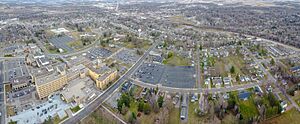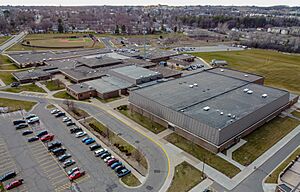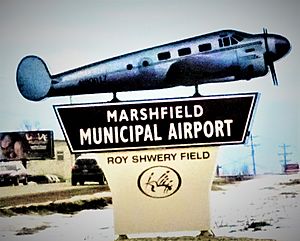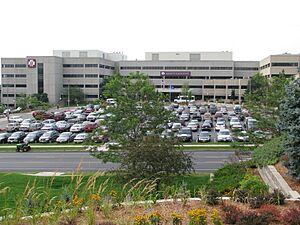Marshfield, Wisconsin facts for kids
Quick facts for kids
Marshfield, Wisconsin
|
|
|---|---|

|
|
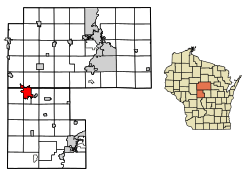
Location of Marshfield, Wisconsin
|
|
| Country | United States |
| State | Wisconsin |
| Counties | Wood, Marathon |
| Incorporated | April 4, 1883 |
| Area | |
| • City | 13.828 sq mi (35.814 km2) |
| • Land | 13.801 sq mi (35.744 km2) |
| • Water | 0.027 sq mi (0.071 km2) |
| Elevation | 1,286 ft (392 m) |
| Population
(2020)
|
|
| • City | 18,929 |
| • Estimate
(2023)
|
18,736 |
| • Density | 1,357.67/sq mi (524.19/km2) |
| • Urban | 19,462 |
| • Metro | 73,939 |
| Time zone | UTC–6 (Central (CST)) |
| • Summer (DST) | UTC–5 (CDT) |
| ZIP Code |
54449
|
| Area code(s) | 715 and 534 |
| FIPS code | 55-49675 |
| GNIS feature ID | 1569085 |
Marshfield is a city in Wisconsin, located in both Wood and Marathon counties. In 2020, about 18,929 people lived there. Most of the city's population lives in Wood County.
Marshfield is an important city in the Marshfield–Wisconsin Rapids area. It is where U.S. Highway 10, Highway 13, and Highway 97 meet. The city is also famous for the Marshfield Clinic, a very large healthcare system that helps people across much of Wisconsin.
Contents
History of Marshfield
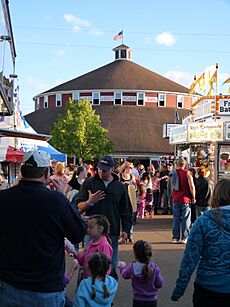
Marshfield was settled later than many towns nearby. The first building in Marshfield was built in 1872. Before that, the area was mostly thick forest.
In 1872, the Wisconsin Central Railway was building a new train line. They needed a place to store supplies between Stevens Point and Colby. Marshfield was chosen because it was about halfway between these two towns.
Louis Rivers, his wife, child, and brother Frank were the first to settle here. They cleared a space in the forest and built a simple two-room log hotel. This was the first permanent building in Marshfield.
How Marshfield Got Its Name
There are two ideas about how Marshfield got its name:
- It might have been named after John J. Marsh, who owned some of the land in the area.
- It could also be named after Marshfield, Massachusetts. The Wisconsin Central Railway got money from Massachusetts, and other towns along its line were named after places in that state, like Amherst and Medford.
Early Growth and Industries
The first big business in Marshfield was a factory that made parts for barrels and wagon wheels. In 1878, William H. Upham, who later became the governor of Wisconsin, built a sawmill here. His businesses grew to include a general store, a furniture factory, and a flour mill.
Other businesses soon followed, like an alcohol factory, hotels, and newspapers. The city officially became a town in 1883. By 1885, over 2,000 people lived in Marshfield.
The Great Fire of 1887
On June 27, 1887, a big fire started in Marshfield. It was a very dry time, and a spark from a train set fire to lumber at Upham's mill. The fire quickly spread, destroying the sawmill and flour mill. It then moved into homes and the main business area.
People tried to stop the fire, even blowing up buildings to create gaps. But the fire was too strong, and embers flew everywhere, starting new fires. In the end, 250 buildings were destroyed, but luckily, no one died. William Upham promised to rebuild his businesses right away. Nearby towns sent supplies by train to help Marshfield recover. After the fire, the city decided that new buildings in the downtown area should be made of brick to prevent future disasters.
The "Hub City"
The late 1800s were a time of many new railroads. The first line came through Marshfield in 1872. Soon, more lines were built, connecting Marshfield to other towns like Neillsville, Wisconsin Rapids, and Wausau. By 1903, 38 passenger trains stopped in Marshfield every day! Because so many train tracks met in the city, Marshfield earned the nickname "Hub City."
Farming and Healthcare Growth
Marshfield also became a center for farming, especially dairy. Cheese factories started, and companies like Roddis and Blum Brothers made wooden boxes for cheese. In 1907, the first cold storage plant was built to keep local cheese fresh before it was shipped by train. Ice cream factories and other dairy businesses followed. By 1923, Marshfield was shipping more dairy products than any other city in the United States!
Healthcare also grew in Marshfield. St. Joseph's Hospital opened in 1890 with just six beds. In 1916, six local doctors started a group practice called Marshfield Clinic. This clinic has grown into a very large healthcare system today.
World War II and Beyond
During World War II, companies in Marshfield helped the war effort. Roddis Lumber and Veneer made plywood for "Liberty ships," which were important cargo ships. Felker Brothers also made parts for these ships.
After the war, companies like Frey brothers started building mobile and modular homes. While some older industries have changed, the medical complex (Marshfield Clinic) has continued to grow. Roehl Transport, a large trucking company, also started here. Around 2011, new plants opened to process sand used for oil and gas drilling.
Geography and Climate
Marshfield is located at 44°40′7.87″N 90°10′18.48″W / 44.6688528°N 90.1718000°W. It sits on a low ridge that geologists call the Marshfield moraine.
The city covers about 13.8 square miles (35.8 square kilometers). Most of Marshfield is in Wood County, but some smaller parts to the north are in Marathon County.
Weather in Marshfield
Marshfield has a "Humid continental climate," which means it has warm summers and cold, snowy winters.
| Climate data for Marshfield, Wisconsin, 1991–2020 normals, extremes 1912–present | |||||||||||||
|---|---|---|---|---|---|---|---|---|---|---|---|---|---|
| Month | Jan | Feb | Mar | Apr | May | Jun | Jul | Aug | Sep | Oct | Nov | Dec | Year |
| Record high °F (°C) | 55 (13) |
59 (15) |
80 (27) |
91 (33) |
105 (41) |
100 (38) |
104 (40) |
102 (39) |
98 (37) |
90 (32) |
80 (27) |
63 (17) |
105 (41) |
| Mean maximum °F (°C) | 41.6 (5.3) |
46.8 (8.2) |
61.6 (16.4) |
76.2 (24.6) |
84.0 (28.9) |
88.8 (31.6) |
90.1 (32.3) |
88.9 (31.6) |
85.4 (29.7) |
77.4 (25.2) |
60.8 (16.0) |
45.8 (7.7) |
92.2 (33.4) |
| Mean daily maximum °F (°C) | 22.7 (−5.2) |
27.0 (−2.8) |
39.5 (4.2) |
53.4 (11.9) |
66.2 (19.0) |
75.7 (24.3) |
80.0 (26.7) |
77.8 (25.4) |
70.1 (21.2) |
56.7 (13.7) |
40.8 (4.9) |
27.7 (−2.4) |
53.1 (11.7) |
| Daily mean °F (°C) | 14.3 (−9.8) |
17.8 (−7.9) |
29.9 (−1.2) |
43.0 (6.1) |
55.7 (13.2) |
65.5 (18.6) |
69.7 (20.9) |
67.5 (19.7) |
59.3 (15.2) |
46.7 (8.2) |
32.9 (0.5) |
20.3 (−6.5) |
43.5 (6.4) |
| Mean daily minimum °F (°C) | 5.9 (−14.5) |
8.6 (−13.0) |
20.3 (−6.5) |
32.6 (0.3) |
45.2 (7.3) |
55.3 (12.9) |
59.3 (15.2) |
57.2 (14.0) |
48.6 (9.2) |
36.7 (2.6) |
24.9 (−3.9) |
12.9 (−10.6) |
34.0 (1.1) |
| Mean minimum °F (°C) | −16.0 (−26.7) |
−11.5 (−24.2) |
−1.5 (−18.6) |
19.3 (−7.1) |
31.0 (−0.6) |
41.7 (5.4) |
49.0 (9.4) |
46.8 (8.2) |
34.1 (1.2) |
23.8 (−4.6) |
8.8 (−12.9) |
−8.5 (−22.5) |
−18.9 (−28.3) |
| Record low °F (°C) | −37 (−38) |
−33 (−36) |
−28 (−33) |
−1 (−18) |
17 (−8) |
26 (−3) |
38 (3) |
28 (−2) |
20 (−7) |
1 (−17) |
−18 (−28) |
−29 (−34) |
−37 (−38) |
| Average precipitation inches (mm) | 1.08 (27) |
0.96 (24) |
1.71 (43) |
3.08 (78) |
4.13 (105) |
4.79 (122) |
3.83 (97) |
4.01 (102) |
3.91 (99) |
3.03 (77) |
1.93 (49) |
1.42 (36) |
33.88 (859) |
| Average snowfall inches (cm) | 12.4 (31) |
11.7 (30) |
8.8 (22) |
5.1 (13) |
0.1 (0.25) |
0.0 (0.0) |
0.0 (0.0) |
0.0 (0.0) |
0.0 (0.0) |
0.7 (1.8) |
4.9 (12) |
13.4 (34) |
57.1 (144.05) |
| Average extreme snow depth inches (cm) | 11.3 (29) |
12.2 (31) |
10.2 (26) |
2.7 (6.9) |
0.0 (0.0) |
0.0 (0.0) |
0.0 (0.0) |
0.0 (0.0) |
0.0 (0.0) |
0.3 (0.76) |
2.5 (6.4) |
7.9 (20) |
15.0 (38) |
| Average precipitation days (≥ 0.01 in) | 9.6 | 7.8 | 8.9 | 10.9 | 13.5 | 12.6 | 11.6 | 11.0 | 11.9 | 11.0 | 8.9 | 10.1 | 127.8 |
| Average snowy days (≥ 0.1 in) | 8.8 | 7.1 | 4.7 | 2.9 | 0.1 | 0.0 | 0.0 | 0.0 | 0.0 | 0.4 | 3.5 | 8.2 | 35.7 |
| Source 1: NOAA | |||||||||||||
| Source 2: National Weather Service | |||||||||||||
People of Marshfield
| Historical population | |||
|---|---|---|---|
| Census | Pop. | %± | |
| 1880 | 669 | — | |
| 1890 | 3,450 | 415.7% | |
| 1900 | 5,240 | 51.9% | |
| 1910 | 5,783 | 10.4% | |
| 1920 | 7,394 | 27.9% | |
| 1930 | 8,778 | 18.7% | |
| 1940 | 10,359 | 18.0% | |
| 1950 | 12,394 | 19.6% | |
| 1960 | 14,153 | 14.2% | |
| 1970 | 15,619 | 10.4% | |
| 1980 | 18,290 | 17.1% | |
| 1990 | 19,291 | 5.5% | |
| 2000 | 18,800 | −2.5% | |
| 2010 | 19,118 | 1.7% | |
| 2020 | 18,929 | −1.0% | |
| 2023 (est.) | 18,736 | −2.0% | |
| U.S. Decennial Census 2020 Census |
|||
In 2022, there were about 8,807 households in Marshfield. The average household had about 2 people. The median household income was $58,474. About 12.2% of the people in the city lived at or below the poverty line.
Most adults in Marshfield have a high school diploma (95.1%), and many (26.8%) have a bachelor's degree or higher.
The main ancestry reported by people in Marshfield is English (96.5%).
Arts and Fun in Marshfield
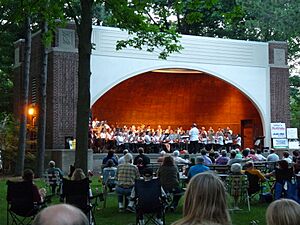
Marshfield has a local arts center called the Chestnut Center for the Arts. You can also visit the New Visions Art Gallery, which is inside the Marshfield Clinic. The Vox Concert Series brings musicians from all over the country to perform in Marshfield. The local university campus also has an art gallery.
The Marshfield Public Library, located downtown, offers programs for both kids and adults.
Places to Visit
- Upham Mansion
- World's Largest Round Barn
- Columbia Park
- Wildwood Park and Zoo
- Jurustic Park
- Wenzel Family Plaza
- Vandehey Waters
Education in Marshfield
The Marshfield School District has several elementary schools (Madison, Grant, Lincoln, Nasonville, and Washington), Marshfield Middle School, and Marshfield High School.
There are also private schools, including Trinity Lutheran School and Immanuel Lutheran School. Columbus Catholic Schools offers education from Pre-K through 12th grade, with St. John the Baptist Primary School, Our Lady of Peace Intermediate School, Columbus Catholic Middle School, and Columbus Catholic High School.
For higher education, Marshfield is home to the University of Wisconsin–Stevens Point at Marshfield and the Marshfield Campus of Mid-State Technical College.
Getting Around Marshfield
Main Roads
 U.S. Highway 10: This highway runs east-west on the south side of the city.
U.S. Highway 10: This highway runs east-west on the south side of the city. Highway 13 (Wisconsin) ("Veterans Pkwy"): This road goes north-south through the city.
Highway 13 (Wisconsin) ("Veterans Pkwy"): This road goes north-south through the city. Highway 97 (Wisconsin) ("N Central Ave"): This road goes north-south through the northeast part of the city.
Highway 97 (Wisconsin) ("N Central Ave"): This road goes north-south through the northeast part of the city. ("W 14th Street, S Central Ave, 29th St, E Galvin Ave, and E 4th St"): This road goes east-west through the south end of the city.
("W 14th Street, S Central Ave, 29th St, E Galvin Ave, and E 4th St"): This road goes east-west through the south end of the city. ("Adler Ave, S Oak Street, St Joseph Ave, Doege Street, and E Becker Rd"): This road goes east-west through the north end of the city.
("Adler Ave, S Oak Street, St Joseph Ave, Doege Street, and E Becker Rd"): This road goes east-west through the north end of the city.
Airport
- KMFI – Marshfield Municipal Airport
Healthcare in Marshfield
The Marshfield Clinic is a very important healthcare system that provides medical care for a large part of northern Wisconsin. It offers special training programs for doctors in many areas, like dermatology and pediatrics. The clinic also hosts medical students from the University of Wisconsin School of Medicine and Public Health.
Marshfield Medical Center is the only hospital in Marshfield. It is a major hospital that serves many people in northern Wisconsin.
Notable People from Marshfield
- Elliot Anderson, Nevada legislator
- Fred Beell, wrestler
- Robert Brokl, artist
- Todd Boss, poet
- John W. Byrnes, U.S. Congressman
- Jose Pablo Cantillo, actor
- Alden Carter, author
- William D. Connor, former Lieutenant Governor of Wisconsin
- Marshall E. Cusic Jr., U.S. Navy admiral
- Tom Domres, NFL player
- Peter Ebbe, Wisconsin State Assembly
- Ethan Finlay, soccer player
- Robert F. Froehlke, former Secretary of the Army
- Bob Galvin, businessman
- Paul Galvin, co-founder of Motorola
- Michael Gungor, Musician
- Donald W. Hasenohrl, Wisconsin State Assembly
- Raymond F. Heinzen, Wisconsin State Senator
- Chester A. Krohn, Wisconsin State Assembly
- Melvin R. Laird, Sr., Wisconsin State Senator
- Melvin R. Laird, former U.S. Secretary of Defense
- Henry A. Lathrop, Wisconsin State Assembly
- MaryAnn Lippert, Wisconsin legislator
- Philleo Nash, former Commissioner of the Bureau of Indian Affairs
- William Noll, Wisconsin State Assembly
- John Oestreicher, Wisconsin State Assembly
- Laurie Olin, Landscape architect
- Everett Roehl, founder of Roehl Transport, Inc.
- Andrew Rock, Olympic gold medalist
- Elwyn E. Royce, Wisconsin State Assembly
- Kelda Roys, Wisconsin State Senator
- Emil P. Scheibe, Wisconsin legislator
- Karl Schuelke, professional football player
- Lauren Sesselmann, professional soccer player
- Rich Seubert, professional football player
- John Stauber, author
- Theodore Steinmetz, composer/conductor
- Adam Stenavich, Offensive coordinator for the Green Bay Packers
- Mark Tauscher, professional football player
- William H. Upham, former governor of Wisconsin
- Gary Varsho, retired professional baseball player
- Daulton Varsho, professional baseball player
- Lee Weigel, professional football player
- Charles Werner, Pulitzer Prize-winning cartoonist
- Eli Winch, Wisconsin legislator
- Elizabeth Zimmermann, knitter and author
See also
 In Spanish: Marshfield (Wisconsin) para niños
In Spanish: Marshfield (Wisconsin) para niños
 | Jessica Watkins |
 | Robert Henry Lawrence Jr. |
 | Mae Jemison |
 | Sian Proctor |
 | Guion Bluford |




